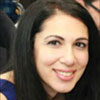I’m interested (and amused) when Americans feel that “Christ is being removed from Christmas.” For example, expanding the winter holiday season to include non-Christian holidays, like Hanukkah, Kwanzaa, and even Ramadan when it falls in the winter, is somehow an assault on Christianity.
This time of the year, I see on the news and on my Facebook feed stories and posts about customers who are angry about Starbucks coffee cup designs or parents who are angry that their children’s schools are having a “holiday party” or a “winter concert” rather than a Christmas celebration.
We’re so deeply invested in defending Christ, it seems, in restoring him to where he belongs.
I wonder if those same people know that they should think about perhaps putting Christ back in Palestine, the birthplace of the Savior and of Christianity itself.
Yes, it’s true—Jesus Christ lived and died in Palestine, and places like Bethlehem and Nazareth are not just towns in Pennsylvania. They are real cities that are the centers of Palestinian Christian life. All those places mentioned in the New Testament, such as the Galilee, are real places, in which Palestinian Arabs still live despite a brutal occupation that has lasted over sixty years.
My parents’ hometown, al-Taybeh, is the biblical town of Ephraim. After raising Lazarus from the dead, Jesus went to Ephraim to think and meditate:
Jesus therefore no longer walked openly among the Jews, but went from there to the region near the wilderness, to a town called Ephraim. (John 11:54)
Al-Taybeh, or Ephraim, is still a vibrant place, and its people and its several churches celebrate Christmas every year, along with the churches in Jerusalem, Bethlehem, and other towns that have Christian populations. In Ramallah, near al-Taybeh, a large Christmas tree is erected every year, and this year it was named by the Huffington Post as one of the memorable Christmas tree displays in the world.
All of this is to say that the Middle East is more diverse than people realize. Palestinians are regularly depicted as terrorist and fanatics, out to destroy Israel. The truth is that the Palestinians have lived under a colonial occupation and have been struggling to liberate themselves from it—Muslims and Christians alike. In my collection, A Curious Land: Stories from Home, there is a story titled “Christmas in Palestine,” in which my main character returns to Palestine in the Christmas season and is confronted by the changes that have taken place politically since she left.
It would be refreshing for once to see Americans interested in restoring Christ historically. The historical Jesus walked the streets of Jerusalem and in the hills of the Galilee, which are still in existence—they are not just ephemeral places without root, or just words delivered from a Sunday pulpit.
Palestinians are a wonderful, diverse, and progressive people. As Sandra Cisneros writes, in her beautiful poem, “homecoming,” it “ain’t like they say in the newspapers.”
___
 Susan Muaddi Darraj is the author of A Curious Land: Stories from Home, winner of the Grace Paley Prize in Short Fiction, The American Book Award, The Arab American Book Award, short-listed for the Palestine Book Award, and named the Best Fiction Book of 2016 by City Paper.
Susan Muaddi Darraj is the author of A Curious Land: Stories from Home, winner of the Grace Paley Prize in Short Fiction, The American Book Award, The Arab American Book Award, short-listed for the Palestine Book Award, and named the Best Fiction Book of 2016 by City Paper.
